Submitted:
26 September 2023
Posted:
28 September 2023
You are already at the latest version
Abstract
Keywords:
1. Introduction
2. Problem Statement
2.1. Review on IDA-PBC design
2.2. Possible uncertainties
3. Controller design and stability analysis
4. Example: the ball and beam system
4.1. System model
4.2. Controller design
4.3. Stability analysis
4.4. Numerical simulation results
5. Conclusions
Author Contributions
Funding
Conflicts of Interest
References
- Ortega, R.; Spong, M. W.; Gomez-Estern, F.; Blankenstein, G. Stabilization of a class of underactuated mechanical systems via interconnection and damping assignment. IEEE Trans. Automat. Contr. 2002, 47, 1218–1233. [Google Scholar] [CrossRef]
- Mahindrakar, A. D.; Astolfi, A.; Ortega, R.; Viola, G. Further constructive results on interconnection and damping assignment control of mechanical systems: the Acrobot example. Int. J. Robust Nonlin. 2010, 16, 671–685. [Google Scholar] [CrossRef]
- Rodriguez, H.; Ortega, R.; Escobar, G. A robustly stable output feedback saturated controller for the Boost DC-to-DC converter. In Proceedings of the 38th IEEE Conference on Decision and Control, Phoenix, AZ, USA, 07-10 December 1999. [Google Scholar]
- Aoues, S.; Matignon, D.; Alazard, D. Control of a flexible spacecraft using discrete IDA-PBC design. IFAC-PapersOnLine 2015, 48, 188–193. [Google Scholar] [CrossRef]
- Acosta, J. A.; Ortega, R.; Astolfi, A.; Mahindrakar, A. D. Interconnection and damping assignment passivity-based control of mechanical systems with underactuation degree one. IEEE Trans. Automat. Contr. 2005, 50, 1936–1955. [Google Scholar] [CrossRef]
- Ryalat, M.; Laila, D. S. A simplified IDA-PBC design for underactuated mechanical systems with applications. Eur. J. Control 2016, 27, 1–16. [Google Scholar] [CrossRef]
- Zhang, M.; Ortega, R.; Liu, Z.; Su, H. A new family of interconnection and damping assignment passivity-based controllers. Int. J. Robust Nonlin. 2016, 50, 50–65. [Google Scholar] [CrossRef]
- Blankenstein, G.; Ortega, R.; Van Der Schaft, A. J. The matching conditions of controlled Lagrangians and IDA-passivity based control. Int. J. Control 2002, 75, 645–665. [Google Scholar] [CrossRef]
- Gomez-Estern, F.; Ortega, R.; Rubio, F. R.; Aracil, J. Stabilization of a class of underactuated mechanical systems via total energy shaping. In Proceedings of the 40th IEEE Conference on Decision and Control, Orlando, FL, USA, 04-07 December 2001. [Google Scholar]
- Viola, G.; Ortega, R.; Banavar, R.; Acosta, J. A.; Astolfi, A. (2007). Total Energy Shaping Control of Mechanical Systems: Simplifying the Matching Equations Via Coordinate Changes. IEEE Trans. Automat. Contr. 2007, 52, 1093–1099. [Google Scholar] [CrossRef]
- Gomez-Estern, F.; Van Der Schaft, A. J. Physical damping in IDA-PBC controlled underactuated mechanical systems. Eur. J. Control 2004, 10, 451–468. [Google Scholar] [CrossRef]
- Tiefensee, F.; Monaco, S.; Normand-Cyrot, D. IDA-PBC under sampling for port-controlled hamiltonian systems. In Proceedings of the 2010 American Control Conference, Baltimore, MD, USA, 30 June-02 July 2010. [Google Scholar]
- Liu, Z.; Theilliol, D.; Yang, L.; He, Y.; Han, J. Interconnection and Damping Assignment Passivity-Based Control Design Under Loss of Actuator Effectiveness. J. Intell. Robot. Syst. 2020, 100, 29–45. [Google Scholar] [CrossRef]
- Donaire, A.; Romero, J. G.; Ortega, R.; Siciliano, B.; Crespo, M. Robust IDA-PBC for underactuated mechanical systems subject to matched disturbances. Int. J. Robust Nonlin. 2017, 27, 1000–1016. [Google Scholar] [CrossRef]
- Haddad, N. K.; Chemori, A.; Belghith, S. Robustness enhancement of IDA-PBC controller in stabilising the inertia wheel inverted pendulum: theory and real-time experiments. Int. J. Control 2017, 91, 2657–2672. [Google Scholar] [CrossRef]
- Haddad, N. K.; Chemori, A.; Pena, J. J.; Belghith, S. Stabilization of inertia wheel inverted pendulum by model reference adaptive IDA-PBC: From simulation to real-time experiments. In 2015 3rd International Conference on Control, Engineering and Information Technology, Tlemcen, Algeria, 25-27 May 2015. 27 May.
- Ryalat, M.; Laila, D. S.; Torbati, M. M. Integral IDA-PBC and PID-like control for port-controlled Hamiltonian systems. In 2015 American Control Conference, Chicago, IL, USA, 01-03 July 2015. 03 July.
- Ferguson, J.; Donaire, A.; Ortega, R.; Middleton, R. H. Robust integral action of port-Hamiltonian systems. IFAC-PapersOnLine 2018, 51, 181–186. [Google Scholar] [CrossRef]
- Ryalat, M.; Laila, D. S. A Robust IDA-PBC Approach for Handling Uncertainties in Underactuated Mechanical Systems. IEEE Trans. Automat. Contr. 2018, 63, 3495–3502. [Google Scholar] [CrossRef]
- Haddad, N. K.; Chemori, A.; Belghith, S. External disturbance rejection in IDA-PBC controller for underactuated mechanical systems: From theory to real time experiments. In 2014 IEEE Conference on Control Applications, Juan Les Antibes, France, 08-10 October 2014. 10 October.
- Guerrero-Sanchez, M. E.; Hernandez-Gonzalez, O.; Valencia-Palomo, G.; Mercado-Ravell, D. A.; Lopez-Estrada, F. R.; Hoyo-Montano, J. A. Robust IDA-PBC for under-actuated systems with inertia matrix dependent of the unactuated coordinates: application to a UAV carrying a load. Nonlinear Dyn. 2021, 105, 3225–3238. [Google Scholar] [CrossRef]
- Chang, D. E. The Method of Controlled Lagrangians: Energy plus Force Shaping. SIAM J. Control Optim. 2010, 48, 4821–4845. [Google Scholar] [CrossRef]
- Delgado, S.; Kotyczka, P. Overcoming the Dissipation Condition in Passivity-based Control for a class of mechanical systems. IFAC Proceedings Volumes 2014, 47, 11189–11194. [Google Scholar] [CrossRef]
- Popayan, J. A.; Cieza, O. B.; Reger, J. Adaptive IDA-PBC for a class of UMSs: the IWIP analysis. IFAC-PapersOnLine 2019, 52, 478–483. [Google Scholar] [CrossRef]
- Franco, E. IDA-PBC with adaptive friction compensation for underactuated mechanical systems. Int. J. Control 2021, 94, 860–870. [Google Scholar] [CrossRef]
- Ryalat, M.; Laila, D. S.; ElMoaqet, H. IDA-PBC with adaptive friction compensation for underactuated mechanical systems. Int. J. Control Autom. Syst. 2021, 19, 864–877. [Google Scholar] [CrossRef]
- Liu, Y.; Yu, H. A survey of underactuated mechanical systems. IET Control. Theory Appl. 2013, 7, 921–935. [Google Scholar] [CrossRef]
- Hauser, J.; Sastry, S.; Kokotovic, P. Nonlinear control via approximate input-output linearization: the ball and beam example. IEEE Trans. Automat. Contr. 1992, 37, 392–398. [Google Scholar] [CrossRef]
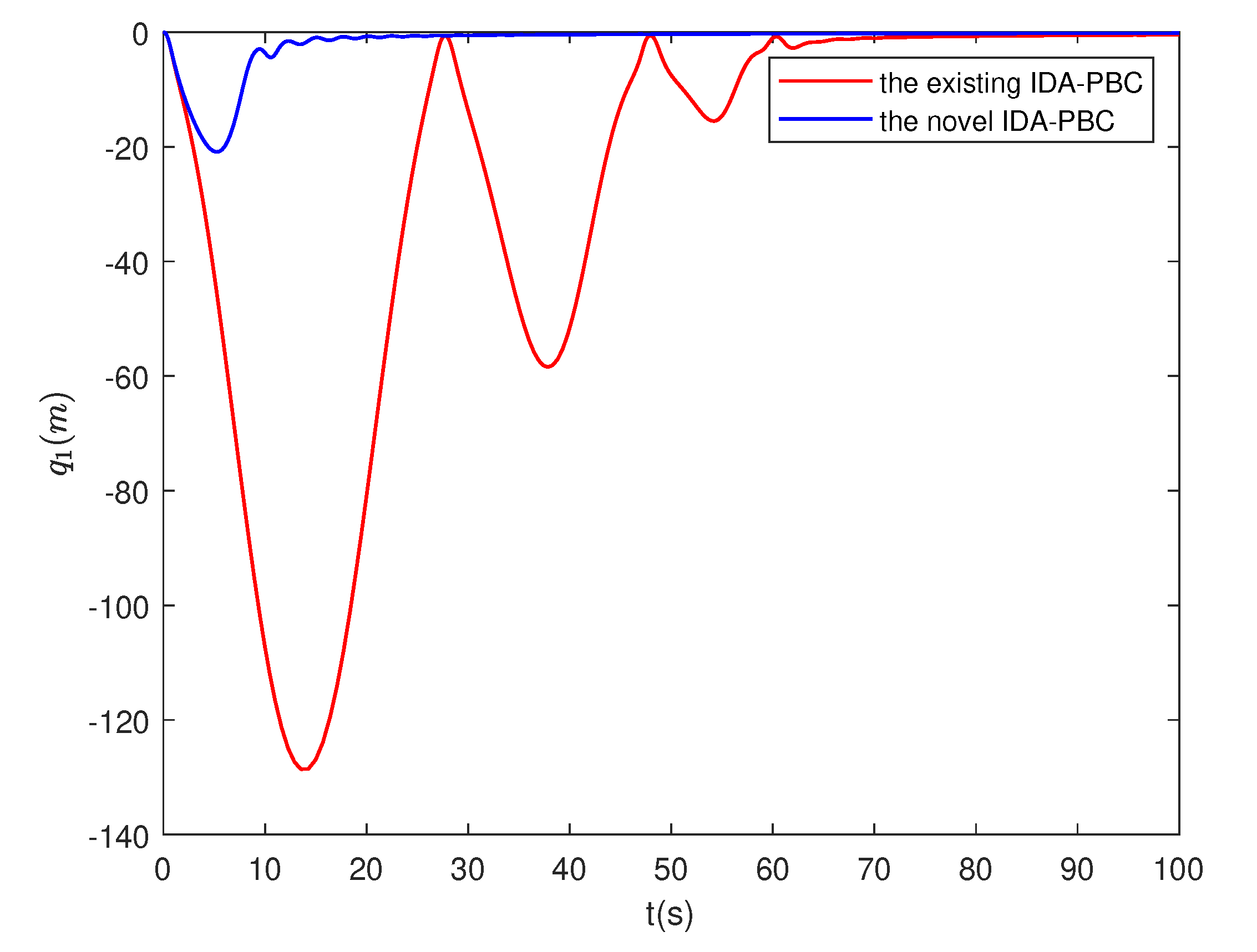

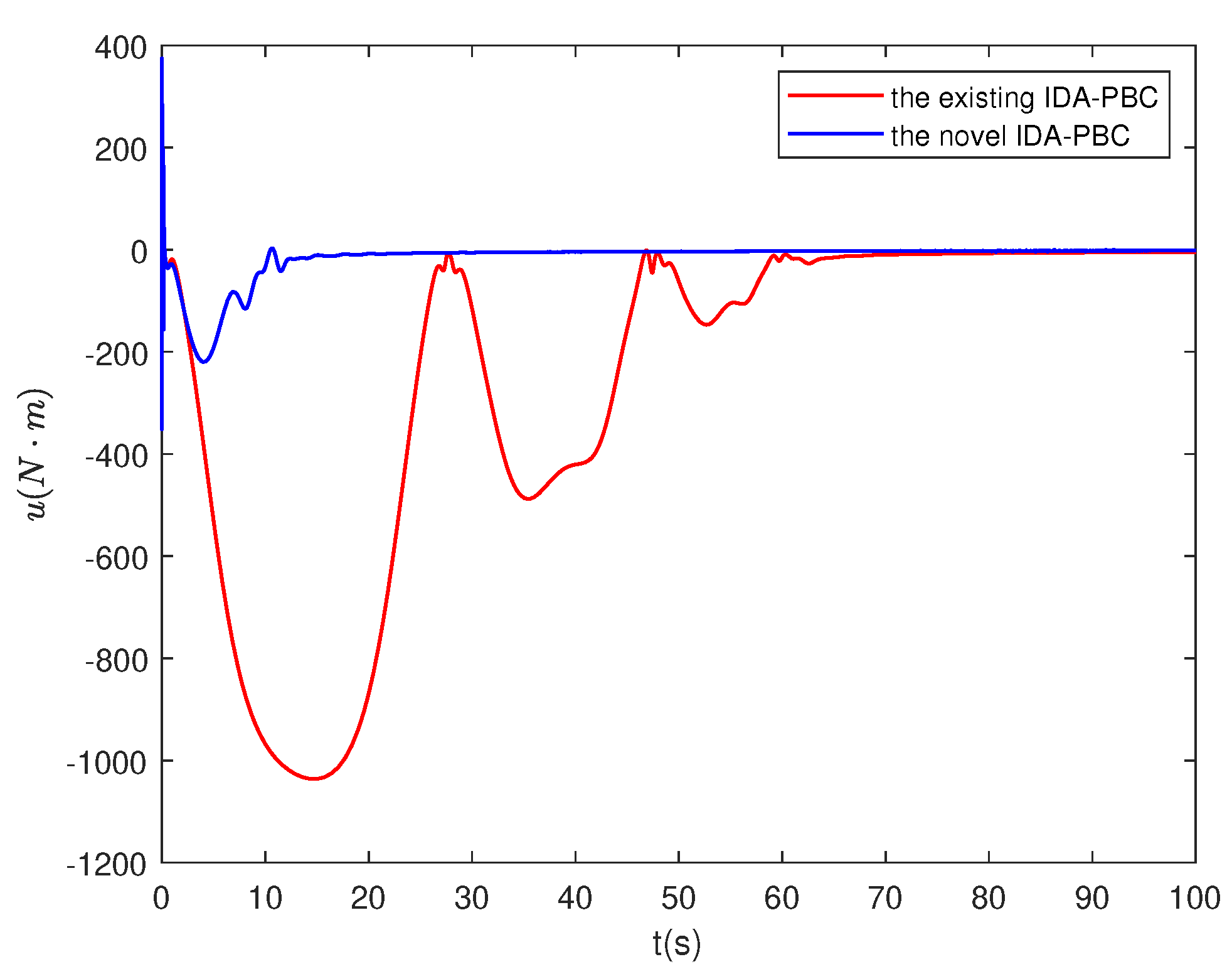
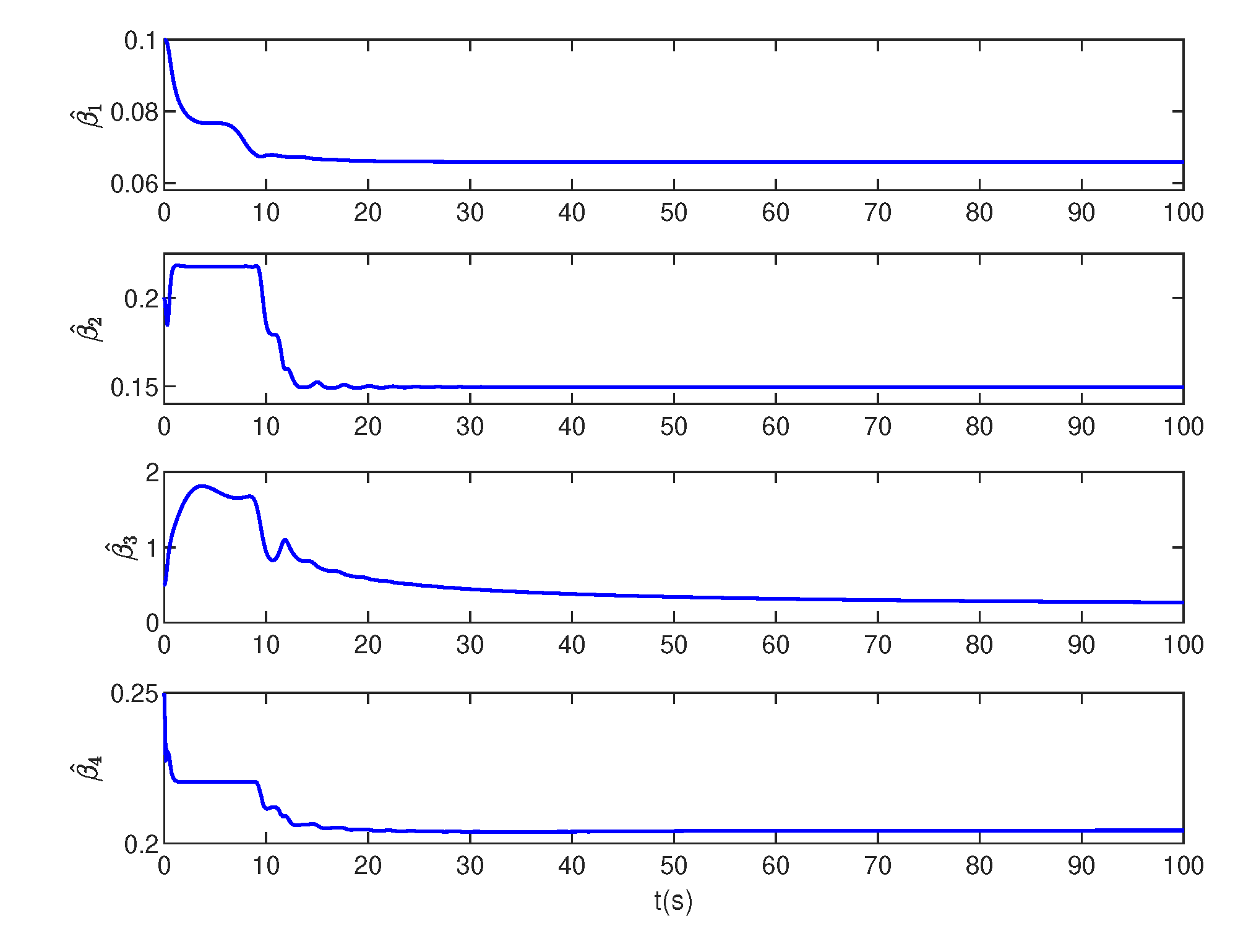
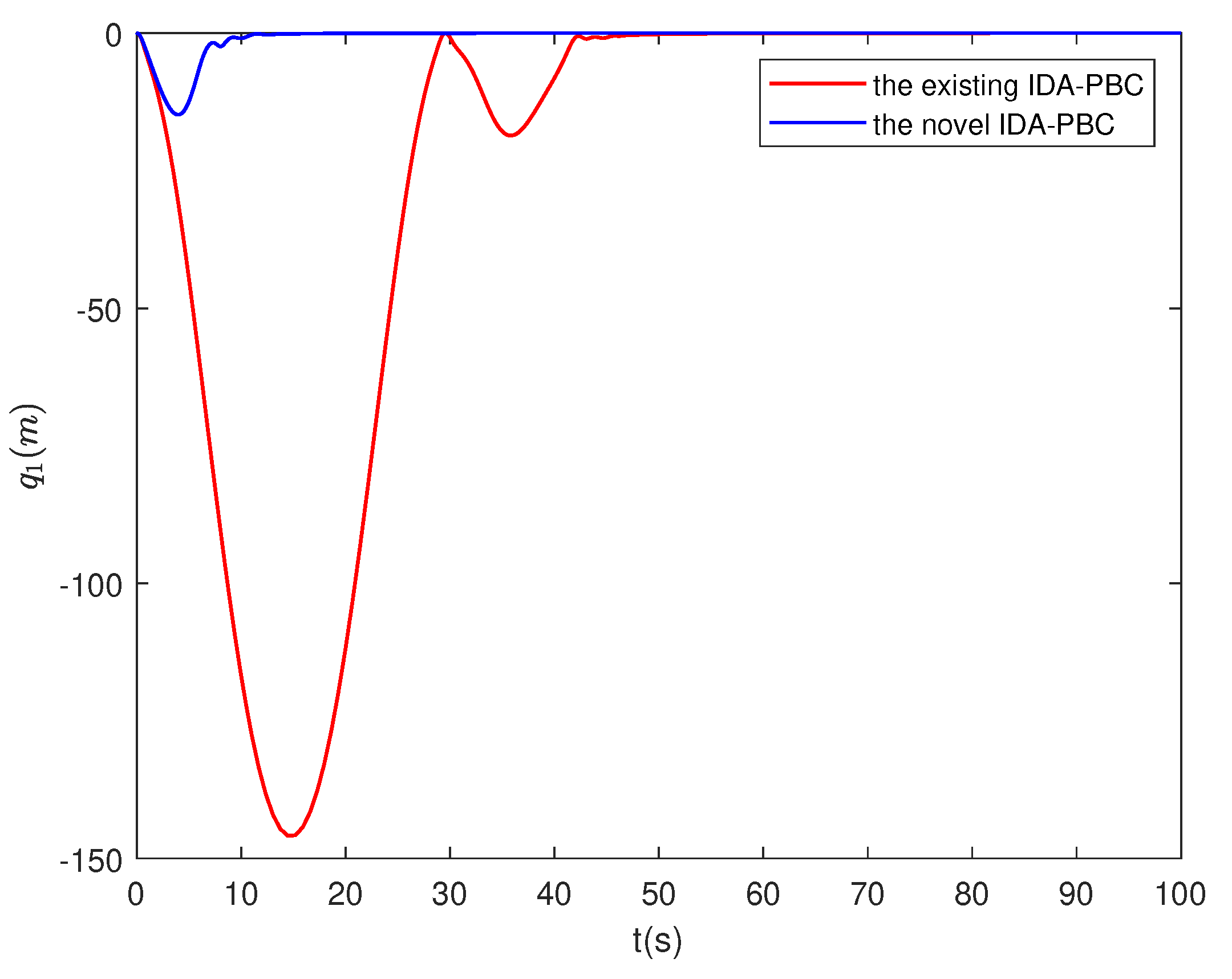
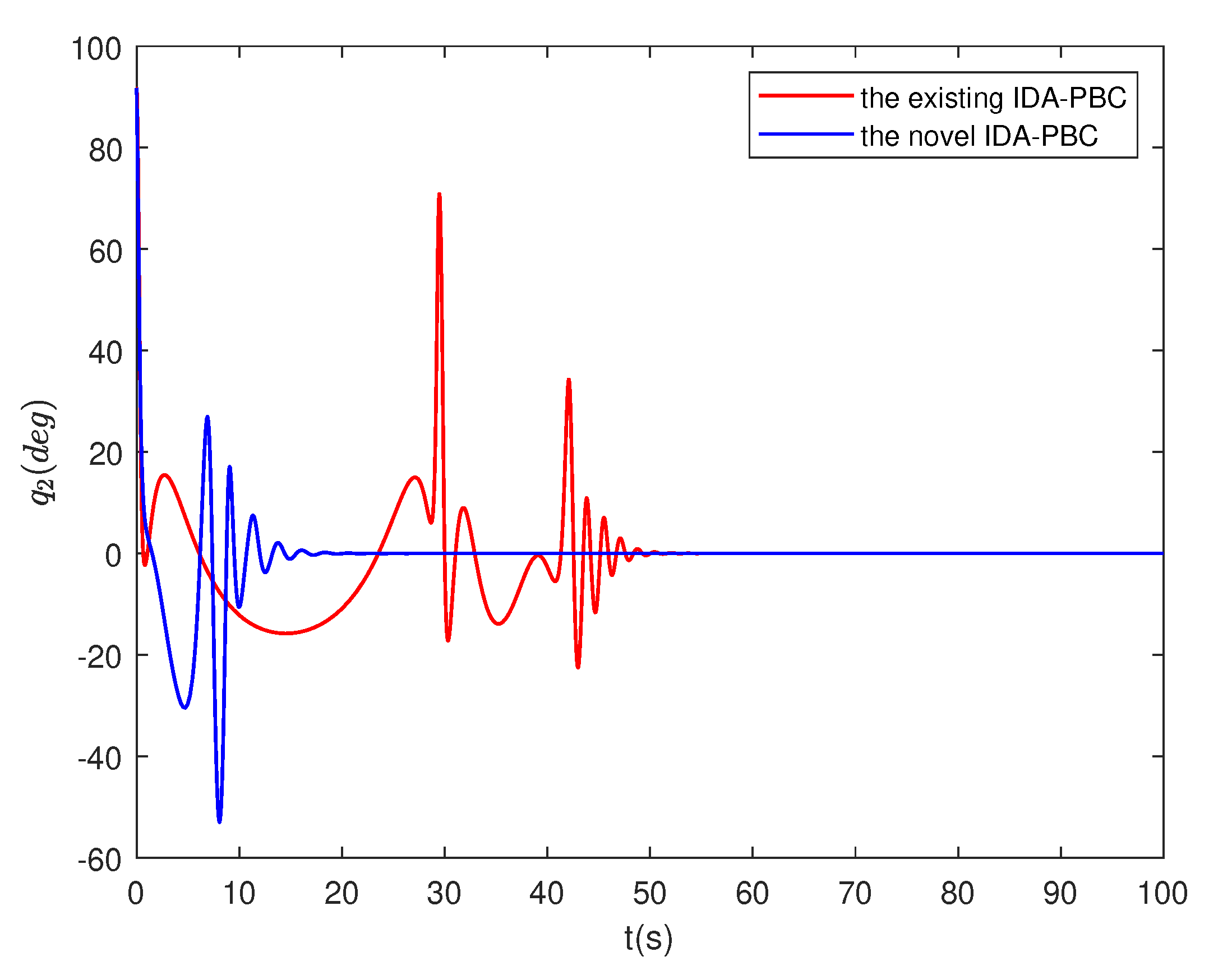
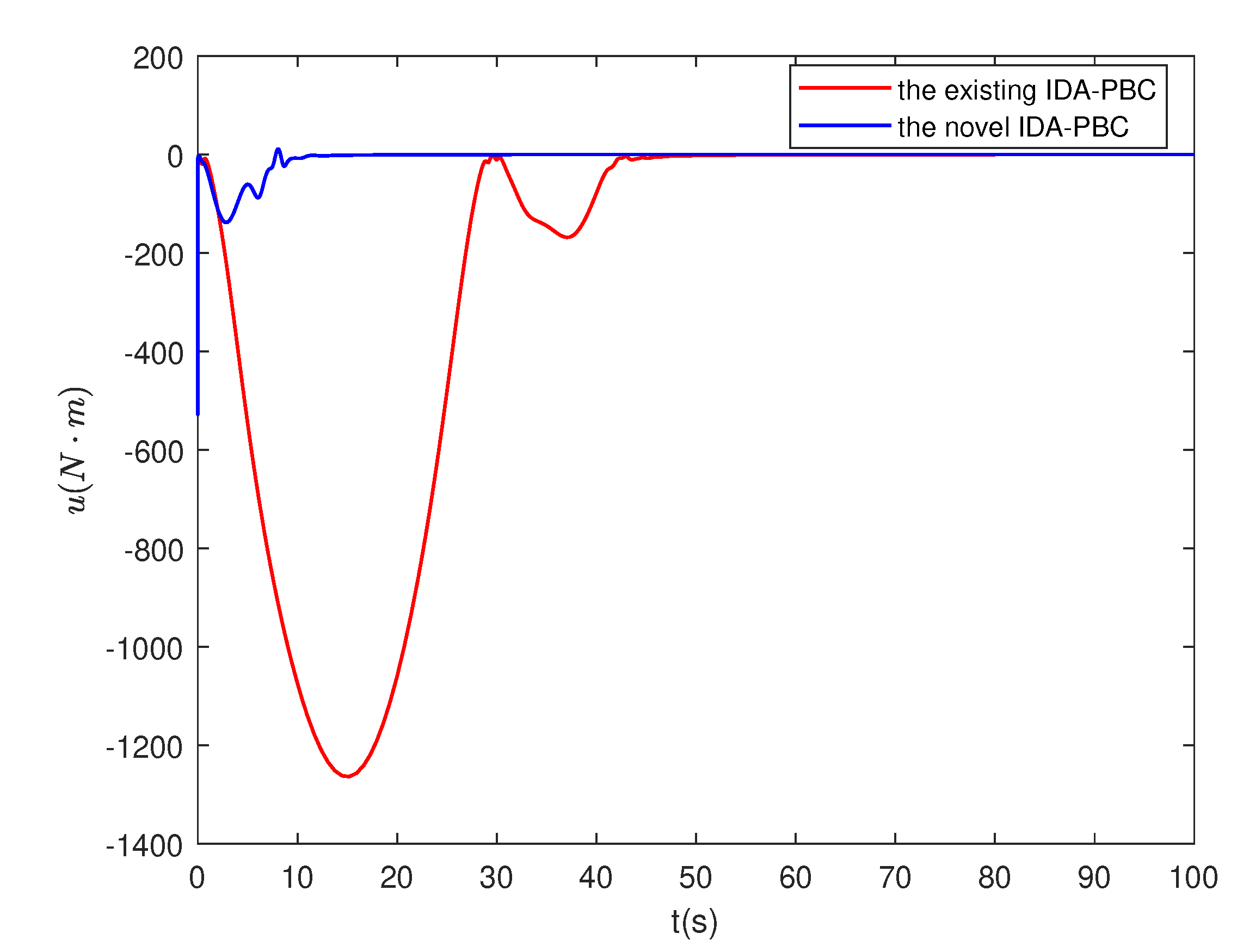
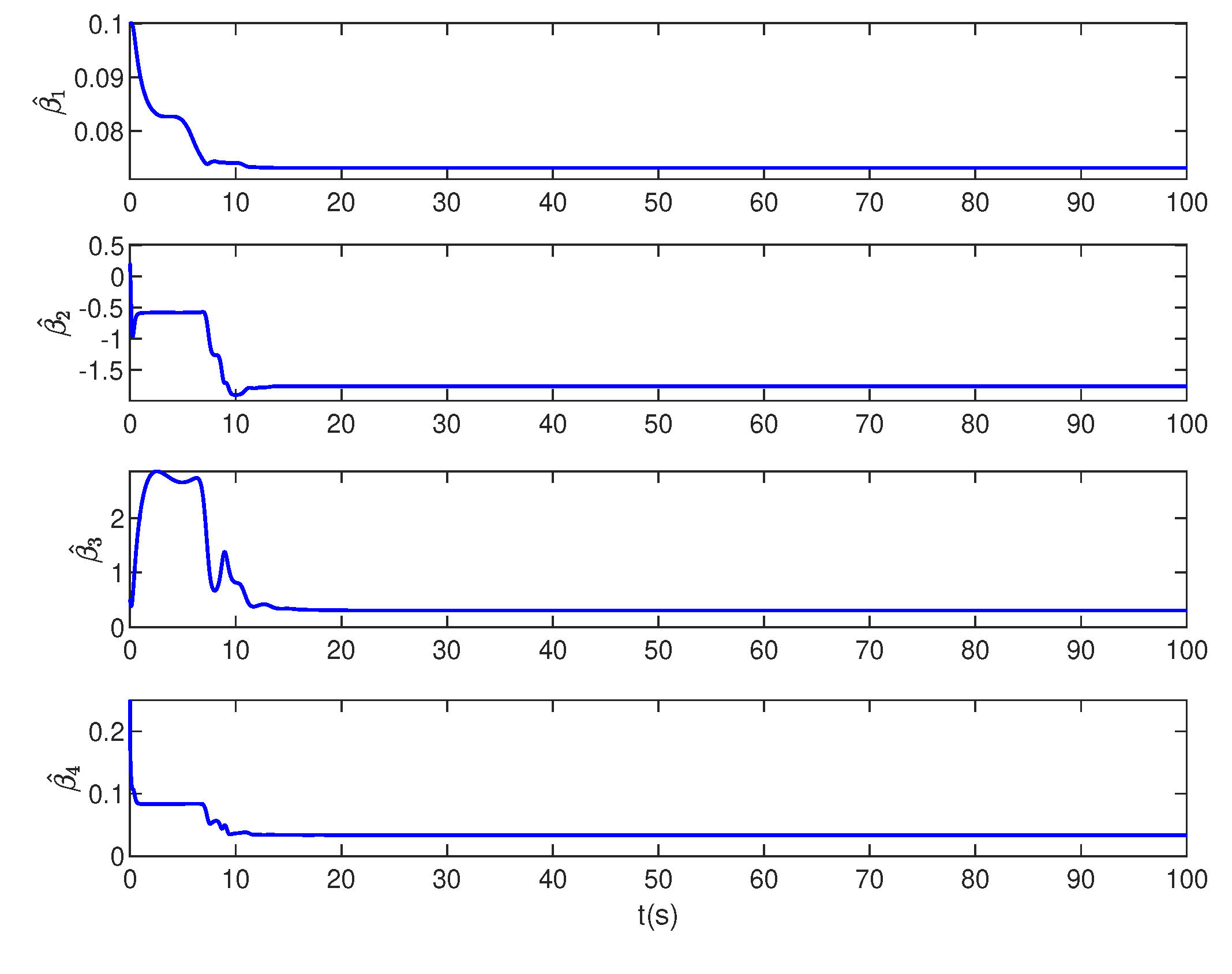
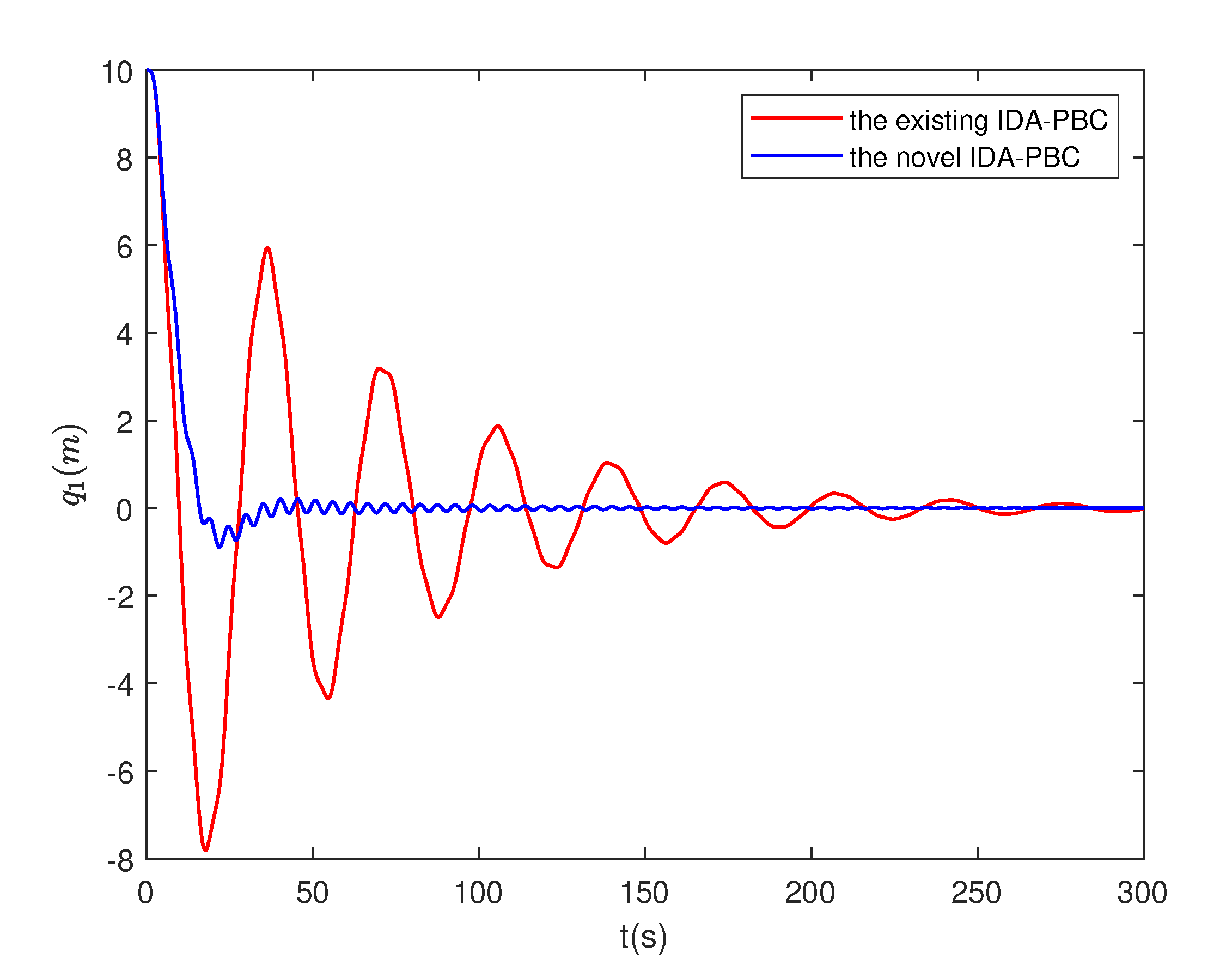
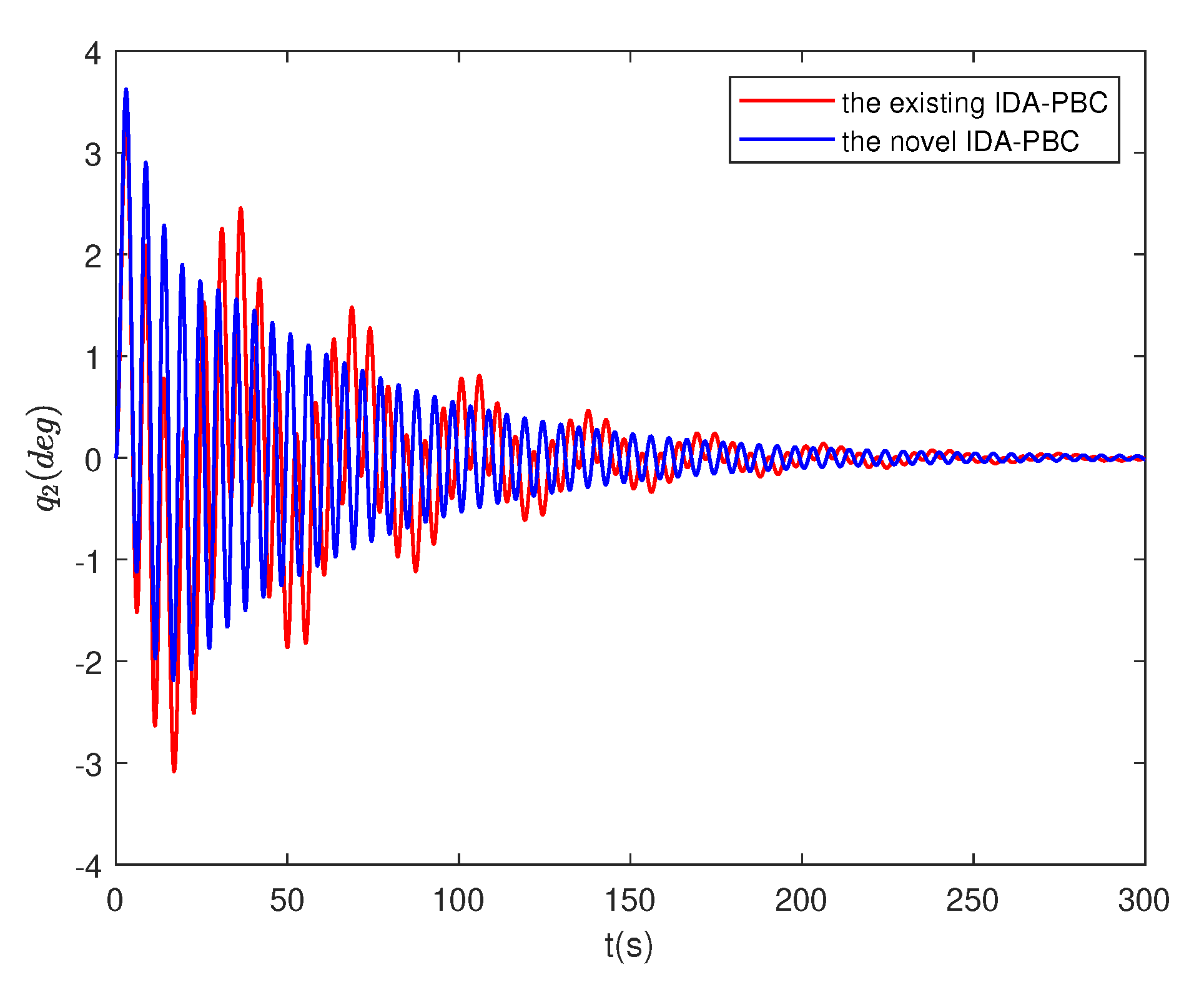
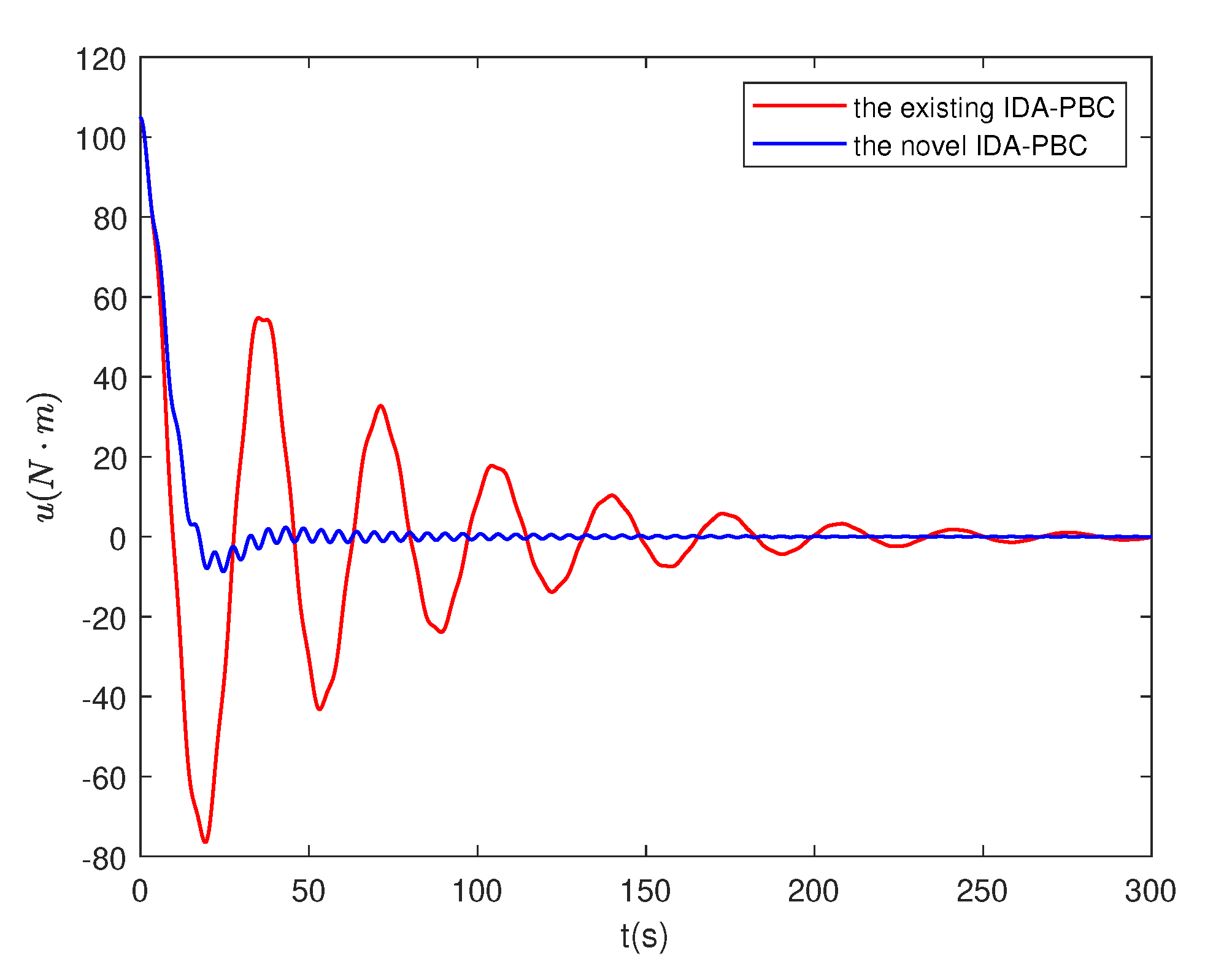

Disclaimer/Publisher’s Note: The statements, opinions and data contained in all publications are solely those of the individual author(s) and contributor(s) and not of MDPI and/or the editor(s). MDPI and/or the editor(s) disclaim responsibility for any injury to people or property resulting from any ideas, methods, instructions or products referred to in the content. |
© 2023 by the authors. Licensee MDPI, Basel, Switzerland. This article is an open access article distributed under the terms and conditions of the Creative Commons Attribution (CC BY) license (http://creativecommons.org/licenses/by/4.0/).




